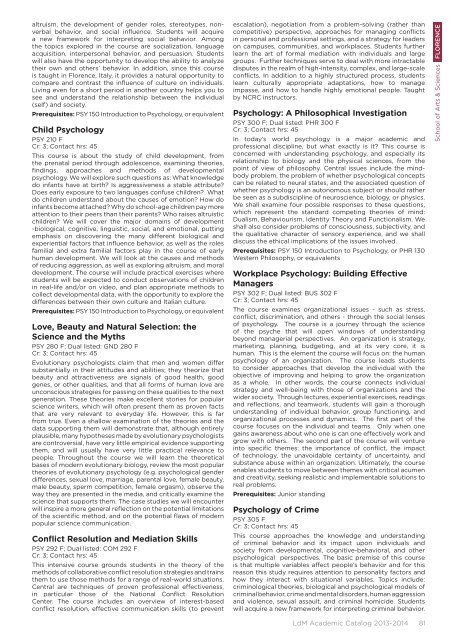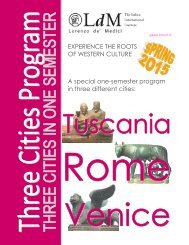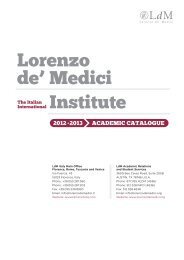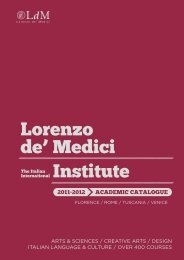aCademiC Catalog 2013-2014 - Lorenzo de Medici
aCademiC Catalog 2013-2014 - Lorenzo de Medici
aCademiC Catalog 2013-2014 - Lorenzo de Medici
Create successful ePaper yourself
Turn your PDF publications into a flip-book with our unique Google optimized e-Paper software.
altruism, the <strong>de</strong>velopment of gen<strong>de</strong>r roles, stereotypes, nonverbal<br />
behavior, and social influence. Stu<strong>de</strong>nts will acquire<br />
a new framework for interpreting social behavior. Among<br />
the topics explored in the course are socialization, language<br />
acquisition, interpersonal behavior, and persuasion. Stu<strong>de</strong>nts<br />
will also have the opportunity to <strong>de</strong>velop the ability to analyze<br />
their own and others’ behavior. In addition, since this course<br />
is taught in Florence, Italy, it provi<strong>de</strong>s a natural opportunity to<br />
compare and contrast the influence of culture on individuals.<br />
Living even for a short period in another country helps you to<br />
see and un<strong>de</strong>rstand the relationship between the individual<br />
(self) and society.<br />
Prerequisites: PSY 150 Introduction to Psychology, or equivalent<br />
Child Psychology<br />
PSY 210 F<br />
Cr: 3; Contact hrs: 45<br />
This course is about the study of child <strong>de</strong>velopment, from<br />
the prenatal period through adolescence, examining theories,<br />
findings, approaches and methods of <strong>de</strong>velopmental<br />
psychology. We will explore such questions as: What knowledge<br />
do infants have at birth? Is aggressiveness a stable attribute?<br />
Does early exposure to two languages confuse children? What<br />
do children un<strong>de</strong>rstand about the causes of emotion? How do<br />
infants become attached? Why do school-age children pay more<br />
attention to their peers than their parents? Who raises altruistic<br />
children? We will cover the major domains of <strong>de</strong>velopment<br />
-biological, cognitive, linguistic, social, and emotional, putting<br />
emphasis on discovering the many different biological and<br />
experiential factors that influence behavior, as well as the roles<br />
familial and extra familial factors play in the course of early<br />
human <strong>de</strong>velopment. We will look at the causes and methods<br />
of reducing aggression, as well as exploring altruism, and moral<br />
<strong>de</strong>velopment. The course will inclu<strong>de</strong> practical exercises where<br />
stu<strong>de</strong>nts will be expected to conduct observations of children<br />
in real-life and/or on vi<strong>de</strong>o, and plan appropriate methods to<br />
collect <strong>de</strong>velopmental data, with the opportunity to explore the<br />
differences between their own culture and Italian culture.<br />
Prerequisites: PSY 150 Introduction to Psychology, or equivalent<br />
Love, Beauty and Natural Selection: the<br />
Science and the Myths<br />
PSY 280 F; Dual listed: GND 280 F<br />
Cr: 3; Contact hrs: 45<br />
Evolutionary psychologists claim that men and women differ<br />
substantially in their attitu<strong>de</strong>s and abilities; they theorize that<br />
beauty and attractiveness are signals of good health, good<br />
genes, or other qualities, and that all forms of human love are<br />
unconscious strategies for passing on these qualities to the next<br />
generation. These theories make excellent stories for popular<br />
science writers, which will often present them as proven facts<br />
that are very relevant to everyday life. However, this is far<br />
from true. Even a shallow examination of the theories and the<br />
data supporting them will <strong>de</strong>monstrate that, although entirely<br />
plausible, many hypotheses ma<strong>de</strong> by evolutionary psychologists<br />
are controversial, have very little empirical evi<strong>de</strong>nce supporting<br />
them, and will usually have very little practical relevance to<br />
people. Throughout the course we will learn the theoretical<br />
bases of mo<strong>de</strong>rn evolutionary biology, review the most popular<br />
theories of evolutionary psychology (e.g. psychological gen<strong>de</strong>r<br />
differences, sexual love, marriage, parental love, female beauty,<br />
male beauty, sperm competition, female orgasm), observe the<br />
way they are presented in the media, and critically examine the<br />
science that supports them. The case studies we will encounter<br />
will inspire a more general reflection on the potential limitations<br />
of the scientific method, and on the potential flaws of mo<strong>de</strong>rn<br />
popular science communication.<br />
Conflict Resolution and Mediation Skills<br />
PSY 292 F; Dual listed: COM 292 F<br />
Cr: 3; Contact hrs: 45<br />
This intensive course grounds stu<strong>de</strong>nts in the theory of the<br />
methods of collaborative conflict resolution strategies and trains<br />
them to use those methods for a range of real-world situations.<br />
Central are techniques of proven professional effectiveness,<br />
in particular those of the National Conflict Resolution<br />
Center. The course inclu<strong>de</strong>s an overview of interest-based<br />
conflict resolution, effective communication skills (to prevent<br />
escalation), negotiation from a problem-solving (rather than<br />
competitive) perspective, approaches for managing conflicts<br />
in personal and professional settings, and a strategy for lea<strong>de</strong>rs<br />
on campuses, communities, and workplaces. Stu<strong>de</strong>nts further<br />
learn the art of formal mediation with individuals and large<br />
groups. Further techniques serve to <strong>de</strong>al with more intractable<br />
disputes in the realm of high-intensity, complex, and large-scale<br />
conflicts. In addition to a highly structured process, stu<strong>de</strong>nts<br />
learn culturally appropriate adaptations, how to manage<br />
impasse, and how to handle highly emotional people. Taught<br />
by NCRC instructors.<br />
Psychology: A Philosophical Investigation<br />
PSY 300 F; Dual listed: PHR 300 F<br />
Cr: 3; Contact hrs: 45<br />
In today’s world psychology is a major aca<strong>de</strong>mic and<br />
professional discipline, but what exactly is it? This course is<br />
concerned with un<strong>de</strong>rstanding psychology, and especially its<br />
relationship to biology and the physical sciences, from the<br />
point of view of philosophy. Central issues inclu<strong>de</strong> the mindbody<br />
problem, the problem of whether psychological concepts<br />
can be related to neural states, and the associated question of<br />
whether psychology is an autonomous subject or should rather<br />
be seen as a subdiscipline of neuroscience, biology, or physics.<br />
We shall examine four possible responses to these questions,<br />
which represent the standard competing theories of mind:<br />
Dualism, Behaviourism, I<strong>de</strong>ntity Theory and Functionalism. We<br />
shall also consi<strong>de</strong>r problems of consciousness, subjectivity, and<br />
the qualitative character of sensory experience, and we shall<br />
discuss the ethical implications of the issues involved.<br />
Prerequisites: PSY 150 Introduction to Psychology, or PHR 130<br />
Western Philosophy, or equivalents<br />
Workplace Psychology: Building Effective<br />
Managers<br />
PSY 302 F; Dual listed: BUS 302 F<br />
Cr: 3; Contact hrs: 45<br />
The course examines organizational issues - such as stress,<br />
conflict, discrimination, and others - through the social lenses<br />
of psychology. The course is a journey through the science<br />
of the psyche that will open windows of un<strong>de</strong>rstanding<br />
beyond managerial perspectives. An organization is strategy,<br />
marketing, planning, budgeting, and at its very core, it is<br />
human. This is the element the course will focus on: the human<br />
psychology of an organization. The course leads stu<strong>de</strong>nts<br />
to consi<strong>de</strong>r approaches that <strong>de</strong>velop the individual with the<br />
objective of improving and helping to grow the organization<br />
as a whole. In other words, the course connects individual<br />
strategy and well-being with those of organizations and the<br />
wi<strong>de</strong>r society. Through lectures, experiential exercises, readings<br />
and reflections, and teamwork, stu<strong>de</strong>nts will gain a thorough<br />
un<strong>de</strong>rstanding of individual behavior, group functioning, and<br />
organizational processes and dynamics. The first part of the<br />
course focuses on the individual and teams. Only when one<br />
gains awareness about who one is can one effectively work and<br />
grow with others. The second part of the course will venture<br />
into specific themes: the importance of conflict, the impact<br />
of technology, the unavoidable certainty of uncertainty, and<br />
substance abuse within an organization. Ultimately, the course<br />
enables stu<strong>de</strong>nts to move between themes with critical acumen<br />
and creativity, seeking realistic and implementable solutions to<br />
real problems.<br />
Prerequisites: Junior standing<br />
Psychology of Crime<br />
PSY 305 F<br />
Cr: 3; Contact hrs: 45<br />
This course approaches the knowledge and un<strong>de</strong>rstanding<br />
of criminal behavior and its impact upon individuals and<br />
society from <strong>de</strong>velopmental, cognitive-behavioral, and other<br />
psychological perspectives. The basic premise of this course<br />
is that multiple variables affect people’s behavior and for this<br />
reason this study requires attention to personality factors and<br />
how they interact with situational variables. Topics inclu<strong>de</strong>:<br />
criminological theories, biological and psychological mo<strong>de</strong>ls of<br />
criminal behavior, crime and mental disor<strong>de</strong>rs, human aggression<br />
and violence, sexual assault, and criminal homici<strong>de</strong>. Stu<strong>de</strong>nts<br />
will acquire a new framework for interpreting criminal behavior.<br />
School of Arts & Sciences FLORENCE<br />
LdM Aca<strong>de</strong>mic <strong>Catalog</strong> <strong>2013</strong>-<strong>2014</strong><br />
81





